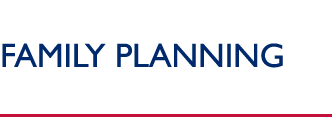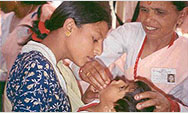Repositioning in Action E-Bulletin
March 2009
Subscribe | Past Issues | Tell Your Story | French Translation
Three New Advocacy Tools to Promote Family Planning
This year marks the 15th anniversary of the International Conference on Population and Development and reminds us of the five years remaining to fulfill the commitments made at Cairo. These commitments include a call for universal access to integrated family planning and reproductive health services.
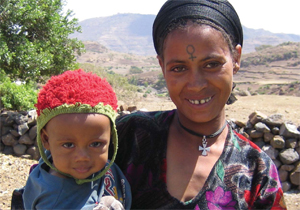 |
|
| Source: Virginia Lamprecht |
|
As the largest bilateral donor of population and health assistance, USAID has been critical in helping countries implement the core objectives of Cairo. While USAID is celebrating what has been accomplished, it is also using this benchmark to acknowledge gaps and challenges, particularly of the need to keep family planning visible and high on national agendas. Cairo’s goal of universal access is not likely to happen without the dedication of legions of advocates around the world, working to keep the spotlight on family planning.
As advocates know, convincing someone to take action requires evidence, strategic thinking, sound communications skills, and persistence. Together, these factors lay the foundation for successful advocacy. USAID is pleased to release the following three new resources to support advocacy for family planning:
Family Planning Advocacy Toolkit
Repositioning Family Planning: Guidelines for Advocacy Action is a new Africa-focused resource. This toolkit, jointly produced by the World Health Organization's Regional Office for Africa and USAID, aims to enable those working to promote family planning across the region to effectively advocate for renewed emphasis on family planning. The toolkit provides guidance for those who may work with influential leaders and decisionmakers at the national and local levels. It also is designed to help advocates convince key program managers, opinion leaders, and policymakers that family planning provides important health and development benefits to individuals, families, communities, and the nation, so that they will (1) act directly or use their influence to expand and improve family planning services and (2) disseminate accurate information on the benefits of family planning.
|
 |
|
Source: Richard Nyberg, Courtesy of Photoshare |
The toolkit also helps advocates recognize the range of audiences that can be mobilized to champion family planning, identifies ways to engage each audience, and determines what each audience can do. It contains the latest family planning data and trends, ready-to-use messages, and suggested activities for reaching out to and involving target groups.
Included in the toolkit are nine briefs:
- Introduction
- Update on Family Planning in sub-Saharan Africa
- Developing an Advocacy Strategy
- Engaging Community Leaders
- Engaging the Private Sector
- Engaging Health Sector Leaders
- Engaging the Media
- Engaging Policymakers
- Additional Resources
The toolkit also includes a CD-ROM that contains copies of the briefs, Internet links, PowerPoint slides, and additional advocacy materials.
Uses for this toolkit include:
- Training others in how to develop comprehensive, policy-level advocacy strategies and action plans within organizations or advocacy coalitions
- Promoting dialogue among a broad range of national and community leaders on the health, social, and economic benefits of increasing access to family planning services
- Working with the media to promote understanding of the benefits of family planning and to increase the quantity and quality of family planning coverage
The toolkit was prepared by the BRIDGE project, which is implemented by the Population Reference Bureau, and the Africa's Health in 2010 project, which is managed by the Academy for Educational Development.
- Download the full report in English [PDF, 2.1MB] and French [PDF, 2.1MB].
New Publication: Family Planning Saves Lives
Family planning saves the lives of millions of women and children in developing countries according to a new report by the Population Reference Bureau. Family Planning Saves Lives, now in its fourth edition, has provided valuable information to policymakers, program planners, and journalists over the years on the health benefits of family planning. While the message has not changed, this new edition presents updated findings on the crucial role of family planning in improving the health of women, children, and adolescents around the world, including:
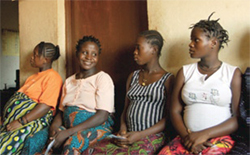 |
|
Pregnant women waiting to see the nurse at a health center in Sierra Leone
Source: Aubrey Wade/Panos Pictures |
|
- Family planning could prevent up to one-third of all maternal deaths by allowing women to delay motherhood, space births, avoid unintended pregnancies and risky abortions, and stop childbearing when they have reached their desired family size.
- Closely spaced births result in higher infant mortality: International survey data show that babies born less than two years after their next oldest brother or sister are twice as likely to die in the first year as those born after an interval of three years.
- Young women face higher risks of dying from pregnancy or childbirth: Women ages 15 to 19 are twice as likely as older women to die from maternal causes; many adolescents are physically immature, which increases their risks of suffering from obstetric complications.
- Family planning prevents abortions: An estimated 20 million risky abortions take place each year – resulting in 67,000 deaths annually, mostly in developing countries. Family planning can prevent many of these tragic deaths by reducing the number of unintended pregnancies that lead to abortions.
To better address the cost implications of investing in mothers and children, the report provides useful data on the cost benefits of family planning programs. Long considered a “best buy” among health investments, family planning is even more important today as countries grapple with recession and search for better ways to stretch limited budgets. Family planning stands out as one of the most cost-effective, high-yield interventions available. At an average supply cost of US$1.55 per user annually, it offers a safe, affordable, and effective way for governments to reduce maternal and child illness and deaths, reduce national health expenditures, and meet important development goals such as the MDGs.
|
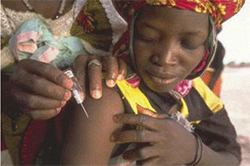 |
|
Young woman receiving Depo Provera injection
Source: David Alexander, Courtesy of Photoshare |
This edition includes new information on how family planning reduces the rates of new HIV infections and deaths from AIDS as well as a “Special Focus” section on the urgent challenges of repositioning family planning in sub-Saharan Africa, where programs have languished in many countries over the last decade.
- Download the full report [PDF, 904KB].
- The French translation will be forthcoming in April 2009.
- Listen to an interview with the lead author, Rhonda Smith. (13 minutes)
New Publication: Making the Case for U.S. International Family Planning Assistance
The United States should renew its political and financial commitment to global family planning programs, say five former USAID directors in this recently released report. To achieve the Millennium Development Goal of universal access to reproductive health services, the authors urge the new Obama Administration to restore U.S. leadership by more than doubling allocations to USAID for international family planning in the next two years (to $1.2 billion) and tripling them by 2014.
Making the Case documents the urgent need for greater assistance to family planning programs and recommends targeted investments to strengthen services in developing countries. The publication is receiving widespread distribution and serves as a wake-up call for governments and donors to help meet the large and growing unmet need for family planning throughout the developing world. The publication was supported by a grant
from the David and Lucile Packard Foundation and The Bill and Melinda Gates Institute for Population and Reproductive Health, Bloomberg School of Public Health, Johns Hopkins University.
We Want to Tell Your Repositioning Story
Please contact Carmen Coles at ccoles@usaid.gov with your successes in family planning programming.
For more information on Repositioning Family Planning, please contact Alexandra Todd at atodd@usaid.gov or Carmen Coles at ccoles@usaid.gov.
Prefer French?
If you prefer to receive the French version of this e-Bulletin, please visit your subscriptions page.
Subscribe | Unsubscribe | Update Your E-mail Address | Other USAID E-Newsletters | Privacy Policy
If you have questions or problems with the subscription service, please contact support@govdelivery.com.
|

